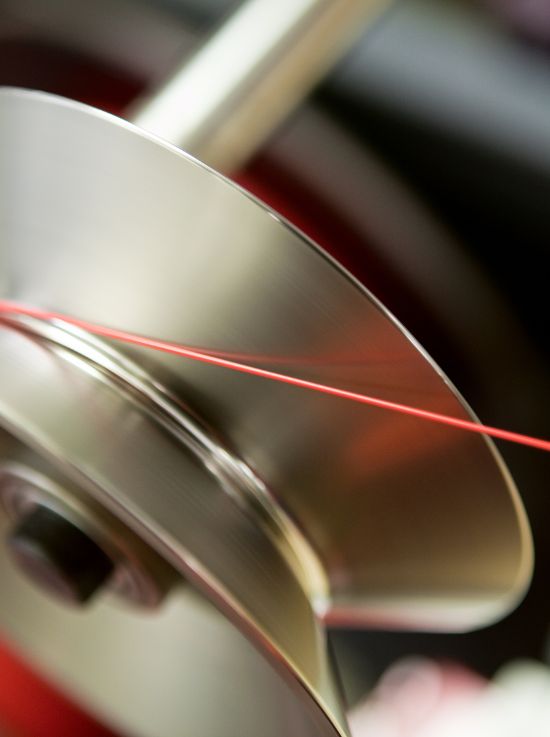- RTE and Nexans combine their expertise and announce the launch of a complete industrial aluminum recycling solution for the manufacturing of power cables.
- For the first time in France, cables from the electricity transmission network will be recycled for reuse on RTE’s high and extra-high voltage lines.
- Based entirely in Europe, this activity will also cut CO2e1 emissions owing to the lower carbon impact of recycled aluminum.
RTE, the French electricity transmission system operator is combining its expertise with Nexans, a leader in the design and manufacturing of cable systems and services as part of a process that began in 2024. Today, the two companies are announcing the launch of a complete industrial aluminum recycling solution for the manufacturing of power cables. For the first time in France, cables from the electricity transmission network will be recycled for reuse on RTE’s high and extra-high voltage lines.
Based entirely in Europe, this activity will recycle 600 metric tons of aluminum per year, from 1,000 metric tons of cables (equivalent to half of the power cables to be dismantled by RTE in 2025). It will also cut CO2e emissions by at least 400 metric tons per year2 owing to the lower carbon impact of recycled aluminum.
Implementing a recycling loop for network equipment in France and Europe is a strategic component of the network development plan (SDDR 2025) presented by RTE on February 13. The challenge is twofold: to use French and European sources for the production and supply of raw materials, and to reduce the carbon footprint of the supplies required for network maintenance and development. Nexans is also committed to the circular economy and the recycling of metal in order to support the growing demands of the electrical industry in a more virtuous way.
Aluminum is one of the main materials with the technical characteristics to be recycled while continuing to meet the stringent technical standards required for use in the electricity transmission network. Over the next fifteen years, aluminum waste from the renewal of high-voltage cables will make up around one-quarter of the overall aluminum requirements of the entire RTE network. Recycled aluminum has a carbon impact between 10 and 20 times lower than that of primary aluminum3, and therefore has a major role to play in reducing the associated greenhouse gas emissions.
In 2023, RTE set up an initial trial involving network cables in the Maine-et-Loire and Corrèze departments. The success of this trial led RTE and Nexans to create the first closed-loop recycling network (i.e. where the material is re-used for the same purpose). Specifically, Nexans is responsible for the “end-to-end” recycling of overhead cables. These cables are collected from all over France and shredded at the Recycâbles site in Noyelles-Godault in northern France before being reintegrated into the aluminum wire production chain in France. The resulting “wire rod” will then be used by Nexans to manufacture recycled cables at its plant in Elouges, Belgium.
The contract signed by Nexans and RTE makes provision for recycling around 600 metric tons of aluminum per year. Although the power cables are intended primarily for the French grid, they will also be used by other Nexans customers, who will benefit from reduced CO2 emissions.
Further, the process will be structured to improve the traceability of used power cables, so that they can be better recycled at the end of their service life. From this year, the cables installed by RTE will contain 10% of recycled aluminum. As part of its SDDR 2025, RTE is aiming to gradually increase the proportion of recycled aluminum in its cables over the next few years, to reach 30% by 2040.
1 CO2e = CO2 equivalent
2 Hypothesis based on aluminum cables manufactured entirely in Europe; and a reduction of up to 1,400 metric tons in CO2e emissions for production in countries with the highest emission levels.
3 International Aluminium Institute – 2022: Primary aluminum: 15.1t CO2e/t aluminum; Recycled aluminum: 0.52 t CO2e/t aluminum
This partnership once again underlines our commitment to sustainable, low-carbon electrification. By setting up this complete recycling loop with our close partner RTE, we are contributing to efficiency, sustainability and the preservation of global resources. We are mobilizing and supporting the entire value chain, taking the entire French and European electricity ecosystem on a virtuous and exemplary journey.

Senior Executive Vice President, Strategic Projects and Key Accounts, Nexans
As part of our public service remit, we wanted to invest in forward-looking sectors contributing to the energy transition. With Nexans, we are addressing the technical challenge of recycling our cables in a high-quality, closed-loop process in Europe. Our aluminum sourcing process is becoming more circular. This illustrates RTE’s twofold ambition with regard to the supplies needed to develop its network: to invest with partners, primarily in France and Europe, and to reduce the carbon footprint of our activities.
Managing Board member, Managing Director in charge of Economy, Strategy and Finance, RTE
Key figures
- 600 metric tons of aluminum recycled in a closed loop per year
- 400 fewer metric tons of CO2 emitted per year
- One-quarter of aluminum requirements for the electricity transmission network may come from the renewal of the high and extra-high voltage network.
- 10% of recycled aluminum in high-voltage cables from this year, with the ambition of reaching 30% in RTE’s high-voltage cables by 2040.







